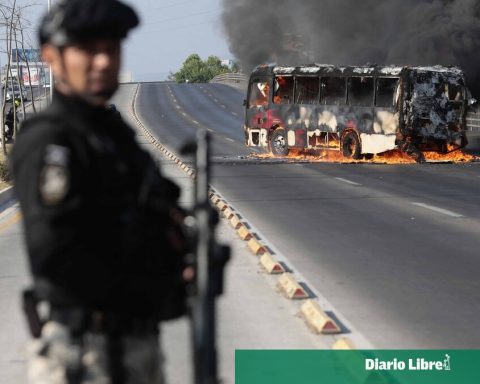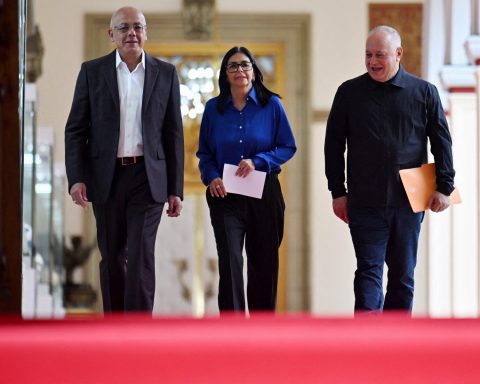Political scientist and professor at George Mason University in the United States, Jo-Marie Burtis someone who is always attentive to what is happening in Latin America and particularly in Peru. In the following interview she answers various topics, including the law approved in Congress – not observed by the Executive – that seeks impunity for human rights violators.
The power Executive decided not to observe the law which declares the inapplicability of crimes against humanity in crimes committed before 2002. Now Congress can enact it. The surprising thing would have been if the Government had opposed it, right?
Yes. I agree with what he says because, definitely, the Dina Boluarte’s government The government has shown a willingness to pursue impunity. For example, it has sought not to investigate cases of murders of civilians committed by law enforcement forces during the protests of 2022 and 2023. On the other hand, it is also a government that has demonstrated a broad and close relationship with Fujimorism and with sectors of the Armed Forces that are also interested in building impunity, not only for current cases but also for those of the past. The law proposes that cases that are classified as crimes of It hurts humanity They cannot be investigated or sanctioned if they were committed before the entry into force of the Rome Statute in 2022.
Because it cannot be applied retroactively, argue the congressmen who have promoted the rule.
Yes, but this is a fallacious argument on several levels. Peru is a signatory to other international treaties, including the American Convention, which also recognizes that the Peruvian State has the obligation to investigate, prosecute and punish serious crimes, including crimes against humanity. On the other hand, Congress’s interpretation does not take into account the fact that the Peruvian judiciary already has more than 100 sentences in cases related to the internal armed conflict, not all of which are convictions. Many are acquittals.
It’s right.
But it does not condemn someone for having committed a crime against humanity. It condemns according to the code in force at the time of the events. Then the Judiciary determines that in international law certain acts constitute crimes against humanity. Fujimori was convicted of qualified homicide, aggravated kidnapping and serious damages, which the Supreme Court determined constitute crimes against humanity and are therefore imprescriptible. On the other hand, the same Convention on the Non-Applicability of Statutory Limitations that Peru signed, I believe in 2003…
That’s right, after the Rome Statute.
Of course, that convention determines that the date of the act committed does not matter. If it is considered a crime against humanity, it must be investigated, prosecuted and punished. From any angle, the legal argument is full of holes, it is very poor and I think they do not care either. They have the control, the power. It is like a veneer of legality to allow impunity. Above all, so that Fujimori does not face new trials. Even though he was pardoned and is free, he has several judicial proceedings and they intend to free him from them. Several military personnel would also be favored.
It will be up to the judges to decide whether or not to heed a rule that, as you have said, seeks impunity for human rights violators and that several specialists have warned is unconstitutional because it goes against the international treaties you have mentioned. What could the international community say?
The international community, especially democratic countries where human rights are an important issue, will question Peru. The Inter-American Court of Human Rights has already warned that this law contravened international obligations and required the State to set it aside, something that Congress obviously ignored. The Executive, having the possibility of complying with its international obligations, could have observed the law and not signed it.
At least as a gesture. Now, it is not that the Peruvian authorities are very concerned about what the international community might say. The IACHR does not pay attention to it.. A recent example is the pardon granted to Alberto Fujimori, who was recently granted a life pension. When one acts with such impunity, when disobedience is already assumed to be normal, what is left?
What he is saying is clear. The Peruvian State under the Boluarte government, in alliance with the current Congress, has demonstrated its lack of concern for the disregard of its international obligations because it has other interests, such as complying with the one who really rules: Fujimorism. Peru is on its way to becoming like Venezuela or Nicaragua, countries that have also been disregarding the Inter-American System, the international system, and their international obligations.
Do you think so?
I believe so. With this law on crimes against humanity, it would be the second time in less than a year that Peru has ignored a requirement of the Inter-American Human Rights System, a key demonstration that Peru does not care about human rights, its international obligations, or victims’ access to justice.
Isn’t it contradictory that Peru has nominated Alberto Borea as a judge of the IACHR?
I found it curious because, as we have said, the Peruvian State has demonstrated its open defiance; there are even those who would like to remove Peru from the Inter-American System.
I was also surprised that the IACHR chose the representative of a country whose government is slandering it.
That depends on the member states that vote. If you look at the composition of the Inter-American Commission, you will realize that suitable people do not always get to these bodies. I could point out a couple of people, including the current rapporteur for Peru, who should not really be commissioners.
What do you think of this lifetime pension that Alberto Fujimori has been granted?
It is a mockery and it is obviously illegal. Several people have said it in the media: a former president who has been convicted is not eligible for a lifetime pension. The pardon – which I maintain was illegal – does not erase his conviction. It is absurd and is another example of the power of Fujimorism.
The judiciary confirmed the sentences of four people who protested against the government during the social unrest of 2022 and 2023. But so far there is no justice for the relatives of the 50 people killed. Is this a new sign of the criminalization of protest in Peru?
Of course. Using criminal law as an instrument to criminalize people who are exercising their right to protest is very serious. It is not the only place in Latin America where we see this. I have not studied the case in detail, I cannot comment in depth, but in general I have seen that criminal law is being used to silence protests, so that people feel inhibited from protesting. The same thing has happened in Guatemala. I said this the last time we spoke.
I’ll change the subject a bit. It also has to do with this contradiction we were talking about. The Peruvian authorities reject the inter-American system, the OAS, but when they refer to other countries, their discourse changes completely. I am referring specifically to the case of Venezuela, where the Chancellor González-Olaechea has been very active. It’s a blatant inconsistency, isn’t it?
Yes, it is very curious to see the Peruvian state or its representatives criticize Venezuela for very similar things that have happened in Peru in the last year and a half…
Calling on the OAS to intervene.
Yes, exactly. When the Inter-American Commission arrived in Peru and published its report on the demonstrations and deaths, those same people called the Commission communist, terrorist, as if it were interfering in something it had nothing to do with. As you rightly say, it is a worrying contradiction because these international mechanisms are not only applicable against those you don’t like. They are applicable to everyone, they are universal. So, what is valid for Maduro is valid for Dina Boluarte, it’s that simple.
I can’t help but ask you about the elections in your country, the United States. Do you think Harris can beat Trump?
Harris’s entry has totally changed the scenario, but she is not guaranteed a victory. What is certain is that there is a total and absolute change in the energy and optimism of the Democratic Party, of its bases, which is very important. As you know, in the United States, unlike in Peru, voting is not obligatory. One thing that political scientists who study the United States say is that the party that manages to mobilize people to go out and vote is the one that ends up winning. In fact, the polls speak of a close competition. Something that does seem aberrant to me is that the president is not elected by the popular vote…
It is an indirect system.
He is elected by the electoral college, which often ends up being a totally undemocratic thing. In the last 25 years we have had two cases where, having lost the popular vote, the candidates still ended up being president. George W. Bush in 2000…
And Trump in 2016.
That’s right. That to me is an aberration and should be changed, but it’s difficult. So, there is also a doubt there. Harris can generate a lot of enthusiasm, but if she doesn’t manage to win in two or three states that are swing statesthat is, swing states where anyone has a chance, such as Pennsylvania, Michigan or Arizona, could end up losing the election.
















